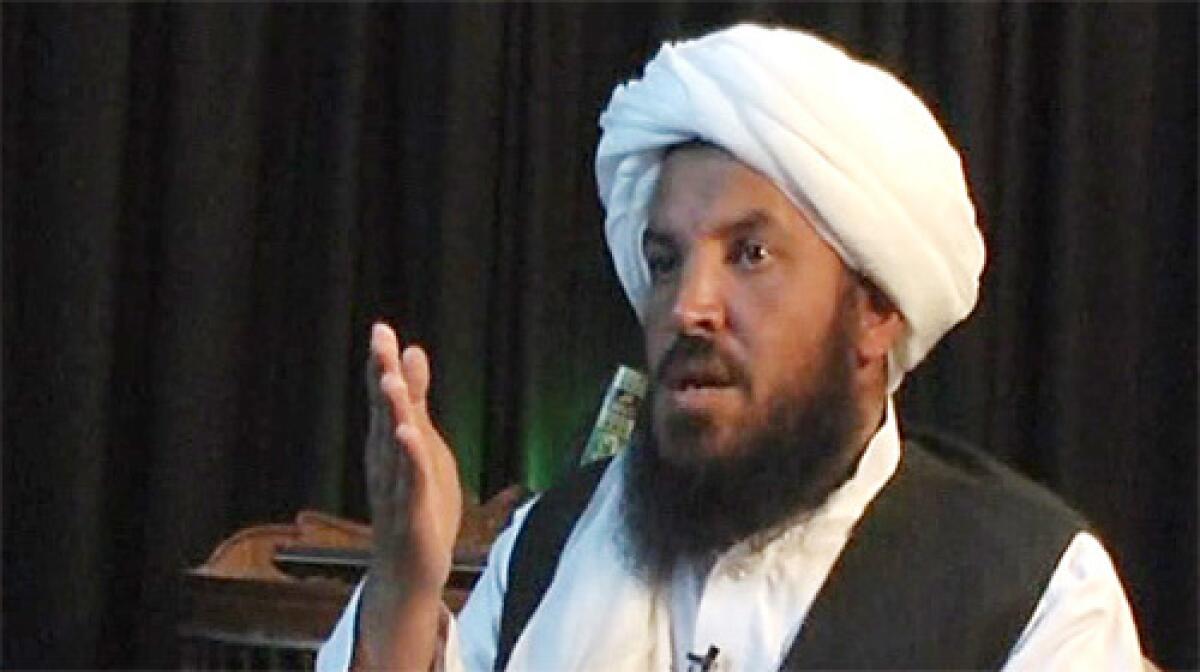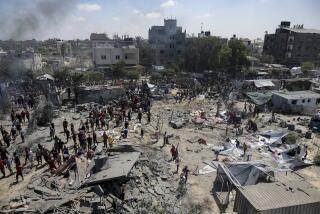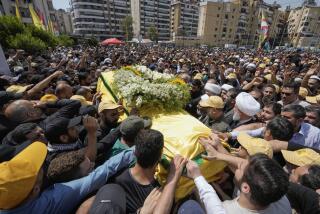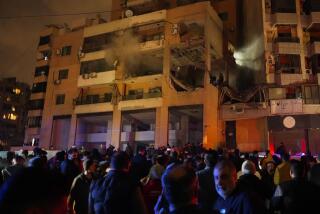Top Al Qaeda commander killed

- Share via
WASHINGTON — A top Al Qaeda commander who trained and led foreign militants assisting the Taliban resurgence in Afghanistan has been killed in neighboring Pakistan, officials said Thursday in what appeared to be a significant victory for U.S.-led forces hunting members of the terrorist network.
The death of Libyan-born Abu Laith al Libi was reported on militant websites, which praised him as a martyr who died helping lead a “holy war” against the West. While Al Libi’s death had not yet been confirmed by forensic evidence, a Western counter-terrorism official said intelligence agencies believed the postings were authentic, and that the militant had been killed within the last few days.
Some other senior Al Qaeda leaders may have died along with him, said the official, who spoke on condition of anonymity because he was not authorized to publicly discuss classified intelligence. “They have lost their senior paramilitary commander for Afghanistan,” the official said. “It doesn’t mean he couldn’t be replaced. But it does mean that Al Qaeda has lost a very seasoned commander with a great deal of experience.”
Pentagon spokesman Lt. Col. Brian Maka said Al Libi was killed in Pakistan, but he provided no details and referred calls to the Pakistani government.
Officials would not comment on whether Al Libi’s death was related to a suspected CIA airstrike this week on an alleged Al Qaeda compound in the Waziristan region of northwest Pakistan.
Less than 48 hours before the report of Al Libi’s death emerged, residents had reported a missile strike on the small compound just outside the town of Mir Ali, which is considered a militant stronghold. Local officials had said about 12 people were killed in the strike late Monday or early Tuesday, most of them “foreigners” -- Arabs and Central Asians, which fits the profile of Al Qaeda fighters present in the tribal areas.
Witnesses said they heard what they believed were Predator drones flying in the area shortly before the compound was hit. But on Wednesday and Thursday, Pakistani officials, including Interior Ministry spokesman Javed Iqbal Cheema and army spokesman Maj. Gen. Athar Abbas, denied any knowledge of the strike, or of Al Qaeda deaths in it.
Airstrikes by the United States on Al Qaeda targets in Pakistan have occurred in the past, but they are extremely sensitive, given the Islamabad government’s stated policy of not allowing U.S. military actions within its borders, American intelligence officials said.
The strike in North Waziristan came just three weeks before highly contentious elections in Pakistan, and as an influential group of U.S. diplomatic and military experts warned that the international effort to stabilize Afghanistan was faltering.
Pakistani President Pervez Musharraf is under international pressure to restore democratic freedoms and ensure that the Feb. 18 balloting will be fair. While the war against Islamic militants is unpopular in Pakistan, Musharraf’s government has often been known to move against militants at times of pressure from the Bush administration to do more to fight Al Qaeda and the Taliban.
The experts warned that the Taliban, regarded as largely defeated just two years ago, has been able to infiltrate and control sizable parts of southern and southeastern Afghanistan. Two suicide bombings Thursday killed seven people, including the deputy governor of Helmand province.
A coordinated attack Jan. 14 by Taliban militants on a hotel in Kabul, the Afghan capital, frequented by foreigners killed seven staff members and visitors.
Al Libi had taken on increasing prominence within Al Qaeda in recent years as a liaison to the Taliban, a battlefield commander and trainer of fighters in Afghanistan who regularly engaged U.S. and allied forces, according to the Western official.
The Libyan oversaw networks “that trained, prepared and deployed fighters from different groups and different countries” in Afghanistan and across the border in the tribal areas of Pakistan, where Al Qaeda’s leadership is believed to be hiding, the official said. He was particularly close to fighters from Central Asia who have become some of the most feared by American and NATO forces in Afghanistan, the Western official said.
“You could place this guy in the top half-dozen figures in Al Qaeda,” the Western official said. “He was a senior operational figure.”
M. Akram Shaheedi, Pakistan’s press attache in Washington, said his government believed that several Al Qaeda operatives were killed in this week’s attack, but that authorities had not yet identified them.
“Surely there are some foreigners who have been killed. Now we are trying to establish the identity of those people,” Shaheedi said, adding that authorities were on the lookout for evidence confirming that Al Libi was among the victims. Shaheedi declined to discuss how the men were killed.
But news of Al Libi’s death spread rapidly through websites that are monitored by Western counter-terrorism authorities and organizations such as the SITE Intelligence Group in Washington.
“We congratulate the Islamic nation for the martyrdom of the sheik, the lion, Abu Laith al Libi,” said a large banner on portions of the Al Ekhlaas website that are reserved for Al Qaeda-affiliated militant groups and not open to public posting, SITE reported.
A second statement by the Al Qaeda-affiliated Al Fajr Media Center was issued later in the day, according to SITE and its director, Rita Katz. Al Fajr stated that Al Libi’s “martyrdom with a group of his brothers” occurred “in the land of Muslim Pakistan.”
“How much he trained his brothers who joined the road of jihad, and how much he supervised the training camps, and how much he instructed them, gave advice, planned, and hurt the enemy. He was an artist in what he did,” SITE quoted the Al Fajr statement as saying.
He was also the leader of an Al Qaeda affiliate known as the Libyan Islamic Fighting Group, which recently has tried with limited success to help Osama bin Laden’s terrorist network spread its influence in North Africa.
Al Libi had become an inspirational presence for Al Qaeda on the Internet, which the network has increasingly used in recent years to disseminate propaganda and training manuals, to look for recruits and to raise funds, according to Katz and several current and former intelligence officials.
Last year, Al Libi appeared in at least three videos made by Al Qaeda’s production arm, As Sahab Media, including one in November in which he announced that he was formally committing his Libyan group to the larger cause of Al Qaeda, according to SITE translations of the videos.
A U.S. military spokesman said last year that Al Libi was probably behind the suicide bombing that killed 23 people outside the main U.S. base in Afghanistan during a visit by Vice President Dick Cheney.
Cheney was far inside the perimeter of the large Bagram Air Base at the time of the Feb. 27 attack and wasn’t hurt, but the bombing added to the impression that coalition forces and the government of Afghan President Hamid Karzai were vulnerable to assault by Al Qaeda militants and the resurgent Taliban.
Times staff writers Laura King in Karachi, Pakistan, and Sebastian Rotella in Madrid contributed to this report.
More to Read
Sign up for Essential California
The most important California stories and recommendations in your inbox every morning.
You may occasionally receive promotional content from the Los Angeles Times.













